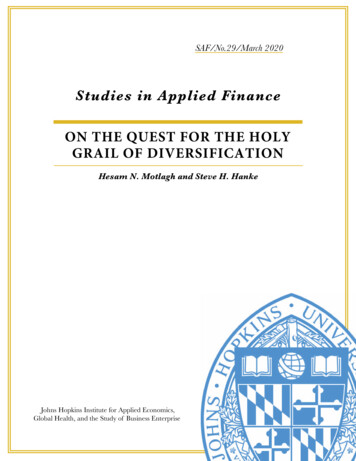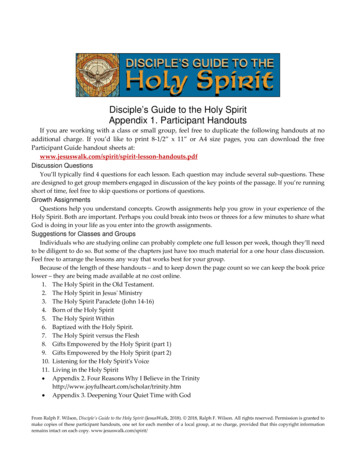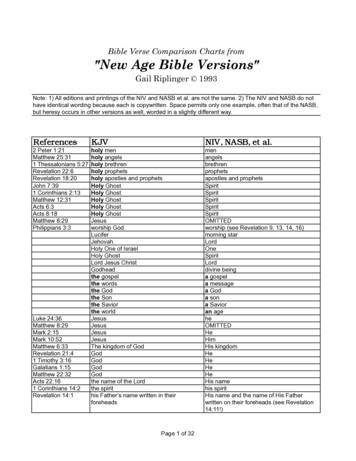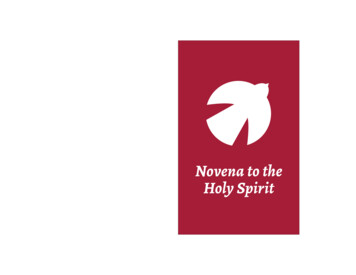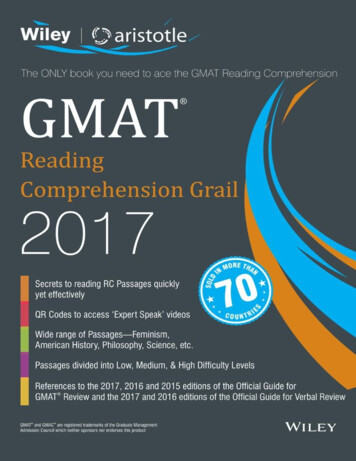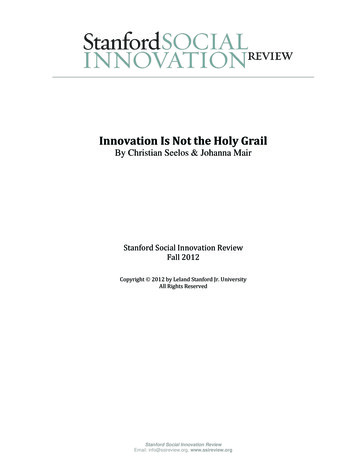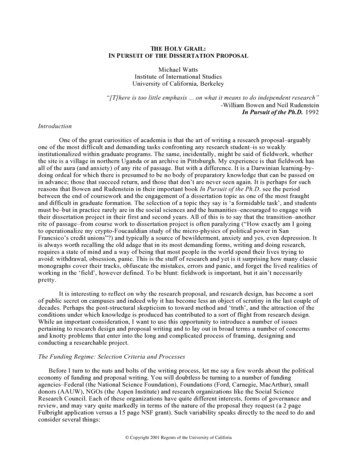
Transcription
THE H OLY G RAIL:IN PURSUIT OF THE DISSERTATION PROPOSALMichael WattsInstitute of International StudiesUniversity of California, Berkeley“[T]here is too little emphasis . on what it means to do independent research”-William Bowen and Neil RudensteinIn Pursuit of the Ph.D. 1992IntroductionOne of the great curiosities of academia is that the art of writing a research proposal–arguablyone of the most difficult and demanding tasks confronting any research student–is so weaklyinstitutionalized within graduate programs. The same, incidentally, might be said of fieldwork, whetherthe site is a village in northern Uganda or an archive in Pittsburgh. My experience is that fieldwork hasall of the aura (and anxiety) of any rite of passage. But with a difference. It is a Darwinian learning-bydoing ordeal for which there is presumed to be no body of preparatory knowledge that can be passed onin advance; those that succeed return, and those that don’t are never seen again. It is perhaps for suchreasons that Bowen and Rudenstein in their important book In Pursuit of the Ph.D. see the periodbetween the end of coursework and the engagement of a dissertation topic as one of the most fraughtand difficult in graduate formation. The selection of a topic they say is ‘a formidable task’, and studentsmust be–but in practice rarely are in the social sciences and the humanities–encouraged to engage withtheir dissertation project in their first and second years. All of this is to say that the transition–anotherrite of passage–from course work to dissertation project is often paralyzing (“How exactly am I goingto operationalize my crypto-Foucauldian study of the micro-physics of political power in SanFrancsico’s credit unions”?) and typically a source of bewilderment, anxiety and yes, even depression. Itis always worth recalling the old adage that in its most demanding forms, writing and doing research,requires a state of mind and a way of being that most people in the world spend their lives trying toavoid: withdrawal, obsession, panic. This is the stuff of research and yet is it surprising how many classicmonographs cover their tracks, obfuscate the mistakes, errors and panic, and forget the lived realities ofworking in the ‘field’, however defined. To be blunt: fieldwork is important, but it ain’t necessarilypretty.It is interesting to reflect on why the research proposal, and research design, has become a sortof public secret on campuses and indeed why it has become less an object of scrutiny in the last couple ofdecades. Perhaps the post-structural skepticism to toward method and ‘truth’, and the attraction of theconditions under which knowledge is produced has contributed to a sort of flight from research design.While an important consideration, I want to use this opportunity to introduce a number of issuespertaining to research design and proposal writing and to lay out in broad terms a number of concernsand knotty problems that enter into the long and complicated process of framing, designing andconducting a researchable project.The Funding Regime: Selection Criteria and ProcessesBefore I turn to the nuts and bolts of the writing process, let me say a few words about the politicaleconomy of funding and proposal writing. You will doubtless be turning to a number of fundingagencies–Federal (the National Science Foundation), Foundations (Ford, Carnegie, MacArthur), smalldonors (AAUW), NGOs (the Aspen Institute) and research organizations like the Social ScienceResearch Council. Each of these organizations have quite different interests, forms of governance andreview, and may vary quite markedly in terms of the nature of the proposal they request (a 2 pageFulbright application versus a 15 page NSF grant). Such variability speaks directly to the need to do andconsider several things: Copyright 2001 Regents of the University of Califoria
Identify the panoply of organizations that might consider funding a project such as your own on saymilitary security; the Foundations register, your University research office and this website areobvious places to begin! You might also want to check out our resources page. Be creative and flexible is reading the rubric of each funder and the specific program inquestion—perhaps a program on “peace and co-operation”–to consider the ways in which your owninterests may be ‘packaged’ (take note: not compromised) to be eligible for program and congruentwith the grant guidelines. Dig around to locate background information on the funding agency (what sorts of projects havethey funded in the past, who is on the selection committee?). Take careful note of the deadlines and the requirements of each application to give yourself time toprepare your proposals (six months minimum of writing, feedback and rewriting, and request lettersof support as a teacher let me say that (a very quick way to seriously piss off your overworkedadvisor and to undermine your credibility is to request that letter of recommendation the day beforethe deadline). Recall that all such research competitions are competitions! Getting support is competitive, andbecoming more so. The consequences are severalfold. You have to give the competition your bestshot (you cannot submit a piece of garbage just because the deadline comes around). You mustunderstand that the proposal will be read by a number of experts in your field–screeners, selectioncommittees members, program officers and the like. You have to be writing to your peersrecognizing and the experts will be sitting in judgement on what you write. Your project will be (for better or worse) assessed against others; research monies are tight. Areviewer/screener might be reading 30 such proposals from which he/she has to ‘deselect’ 20. Tostand a chance your proposal must not simply be solid and good; it must jump out of the pile. Thereare several ways in my experience in which proposal can jump out of the pile: one is the proposalthat has a typo in the first line or has the hypothesis buried in trivial details in a footnote on page 8.I would not recommend either strategy. Your proposal must ‘grab’ the reader: a tight, compelling,well-written and clever opening paragraph does wonders (I speak from the bitter experience ofreading 100 proposals a year throughout the 1980s and 1990s for SSRC, NSF and other funders). Ameandering fishing expedition will endure that your proposal is heading for the wastebasket. This iscrude and harsh perhaps but the conditions under which your project is reviewed demands someserious reflection. You only have one time only to vote. Most, but not all, programs have one deadline per year. Thisspeaks again to giving yourself the best chance at success–allow yourself time to think, write, andplan for the deadline. You cannot begin too early.Primary Objectives and ParametersI am making a number of assumptions and exhibit a certain conceit in outlining the primaryconcerns that should inform the construction of a research proposal (as an exemplar of research design).I do this because I am assuming that most of you are in the process of doing this or thinking about it foryour dissertation projects. And this is of course a formative moment in your training. I am assumingthat most of you will conduct something like fieldwork and to do this you’ll need to raise research grantsand hence will need a research proposal (as indeed you will for your own internal departmental anddisciplinary needs). So I am going to walk through the research proposal as a way of flagging somedifficulties and some issues that we all need to think about–because the process IS so difficult, demandingand drawn out. I’ll do this by telling some stories about my own experiences conducting research in WestAfrica (Nigeria/Senegambia), in South India (Kerala) and California (the Sacramento valley). While myinterests are eclectic I’ve had a particular interest in peasants, in rural transformation, in social2
movements, and in a variety of agrarian issues including household dynamics and gender questions.These interests will shape what I have to say.Let me immediately say that I cannot possibly deal in any detail with all of the problems ofresearch design as such: this is not an occasion for a crash course in designing surveys, training assistants,thinking about respondent bias, working through the problems of evidence, or a genealogy ofhermeneutic theory. Neither is this a treatise challenging or even questioning the theoretical ordisciplinary approaches you may have adopted as an economist, anthropologist or historian. Of course Ihave my own biases and for purposes of clarity, I might as well make them explicit now. The first is totake seriously the notion of considering a variety of methodological approaches through which one canapproach a research problem–to raise the idea of multiple methods as something I would encourage youto look into. And second to emphasize some of the key moments in research design and proposalwriting (for example linking evidence to a particular question) as a way of driving home the point thatyou need to be as clear, as self conscious and as explicit as you can be in explaining HOW you willconduct a project (you’ve arrived in rural Idaho to study the militias with your truck and gun rack, nowwhat are you going to do?). A good research design makes your research life in the barrios of LosAngeles or the NGOs of Bogota much easier. In this sense I suppose a research proposal is a sort ofsecurity blanket given all of the unknowns associated with doing fieldwork and collecting data. And inthis regard a proposal by definition pushes you to construct something more than a fishingexpedition–“I’ll go and poke around and see what is there”. A good research proposal provides you withan identifiable problem, a tentative hypothesis or proposition, a road map of necessary evidences, andat least some ideas about how and where that evidence can be located and generated. To leave the warmand cuddly academic groves of Berkeley or Cambridge for the field without having thought carefullythrough all such matters is to invite catastrophe, or at least more confusion and anxiety–which is wheremost people are when they start thinking about a dissertation topic. We can all do with less of this Ipresume. A proposal, then, has the merit of identifying a hypothesis or a hunch or an argument or aparadox to be explained. How else could one begin? There is something worse than a bad hypothesis,idea, or proposition, and that is no hypothesis (idea/proposition) at all.Let me start here with a brief definition of a research proposal: it is a text that links in a moreor less formal way theory, method and evidence. More elaborately we could say that a question orproblem is theorized in such a way that it generates evidentiary needs on the one side, and a series ofmeans (methods) for generating, locating and assessing evidence on the other. How these pieces arearticulated–for example through a comparative study of three country cases using large-nsamples–represents what I would call the research design. As I have already implied, differing fundersimpose different requirements, needs and organizational templates; disciplines may vary in theirinstitutional culture as regards how formal such proposals should be. The language of hypothesis testingmay seem remote in some disciplines or outright anachronistic. But all of the social sciences andhumanities have to grapple with the intellectual and practical problems of conducting independentresearch: namely that some evidence is theory laden, that some questions have particular evidentiarydemands, that some methods may not be appropriate for some questions and so on. I am assuming thatwe are all in the business of writing narratives of differing sorts that sustain arguments, proposition, thatprovide differing sorts of explanations of social life.Put in this way it all sounds straightforward and perhaps pedestrian. But of course it isn’t. It’sthe most difficult thing you will do (yes, even more difficult that writing the dissertation). There arevery good reasons why in their book, In Pursuit of a Ph.D., Bowen and Rudenstein emphasize ‘anxiety’,‘paralysis’ in their account of the genesis of a research project. Now we can talk about why this is thecase: the process is often loosely institutionalized, it is compounded by bad advising and poor training,and it certainly is made no easier by the profound arbitrariness of arriving at a topic. How cansomething predicated on logic and reason be so illogical and unreasonable? Why on earth did I choosebeer-brewing co-operatives in Burundi and not national dental organizations in Des Moines? Therereally is no avoiding this; selecting and designing a research project is hard, exhausting and unsettling; itis also thrilling, exhilarating and exciting.3
But the difficulty of designing and writing a good research proposal is unquestionablycompounded by the lateness to which students come to it. Highly structured coursework, and theimpending nightmares of qualifying exams and so on, typically make the planning horizon theimmediate and the short term rather than three years down the way when you are stepping into thefield. You cannot start thinking about your research project too early for a number of reasons. First ofall the identification of a place and problem–household dynamics in northern Kenya–carries with itenormous implications as regards the skill-set that you need to acquire: language, area studies, large scalesocial survey design and so on–all aside from the typical theory courses that are the very stuff ofgraduate formation. And I think that starting as early as you can is key so that you build into yourformation not simply the need to know fields, but a series of integrated needs to conduct a project (it’ssort of difficult to pick up Chinese language late in the game). Second, the process of writing a researchproposal is profoundly recursive. Your proposal can change radically in the course of being put through6-10 different drafts and through soliciting feedback from your committee, friends and peers. To expectthat this process to take anything less than six months is myopic.Thirdly, the practical “start-up” demands of conducting a project, particularly in a foreignlocation, is time consuming. There is ideally a need to make regular pre-dissertation visits to establishscholarly contacts, affiliations and academic networks; there is a need to scout out possible field researchsites and perhaps improve language skills; and most of all a desire to test one’s primitive ideas on thelocal scholars who are familiar with the subject at hand. To ensure such pre-planning presupposes timeand flexibility and such practical requirements can only be laboriously constructed over time.The great value of a research proposal carefully crafted early on in one’s graduate training is that isacts as a sort of foundation upon which a program of work can be constructed; that is to say is providesan intellectual and methodological roadmap for you. To determine, for example, that you wish to studythe relations between local Ecuadorian environmental NGOs and US-based transnational environmentalorganizations that fund them–with the idea that foreign transnational organizations shapes the agendasand practices of local green groups in specific ways–generates immediate demands for graduate training,to put yourself in other words in the best possible position to both secure funding for the project and toaccomplish a well-organized and effective field project. Quite specifically, one might anticipate thestudent wishing to conduct this project identifying the following areas and fields as (minimally)necessary for the project: Spanish language training, and perhaps a local vernacular should the Ecuadorian NGOs berepresentative of indigenous peoples. Theoretical work on transnational organizations and transnational networking. Methodological training on interviewing and participant observation. Conceptual work on inter-organizational behavior, management and practice. Background work on environmental movements and organizations including funding,structure and governance. Literature searches on Ecuadorian green movements. Affiliations and contacts with organizations in the US and Ecuador that will provide the casestudies for the study.Most of you will be in the business producing a 10-15 page research prospectus for fundingpurposes–and this will provide the template for my discussion–that includes sections on theory, method,design, and plan of work. There is no one way, one narrative structure or proposal organization, to link4
problem, theory, method, and evidence but I would say that there are some generic demands(“principles”) that any compelling proposal must conform to:- Transparency- Clarity- Methodological Precision- Theory-driven expectations- Plan of Work (‘do-ability’)By transparency, I mean that the logic by which theory, evidence and method are connectedmust be explicit and obvious. This implies two things. One is that the reader must be ale to understandhow you are designing your project and what your thinking has been about the ways in which you willapproach your problem or question. Hence if you are proposing to study the nature of social andeconomic differentiation among peasants in northern Thailand in relation to the neo-liberal reformsthen it must be clear how you are going to measure differentiation (what criteria, how many people), themeans by which you will collect data appropriate to the measures you will use, and the measures you aretaking to ensure that you can separate out the effects of the neo-liberal reforms on differentiation fromother ‘causal” forces (say farming ability, household size. Transparency then is simply the legibility ofthe process by which you construct a problem, pose a hypothesis or question, and explore theevidentiary needs of your research and the validity of your results.Clarity refers to the need to strike a balance between the specialized lexicon of theory anddiscipline and the need to be able to “walk-through” a proposal in a way that the reader fully and easilygrasps the internal logic of the study. Clarity does not demand a sort of linguistic or expressive dilutionbut rather highlights the dangers of obfuscation (what exactly is this proposal suggesting?), ambiguityand a lack of sufficient information (what exactly is the author proposing to do in the name ofethnographic fieldwork or “hanging out” in the village?). Methodological precision asserts theimportance of focussing on the “how” question. This is typically the part of the proposal that fundersscrutinize with particular care: and it is often that part of the proposal which students fudge or glossover the knotty problems of evidence. How large a sample, how will the sample be selected, isrepresentativity an issue, how can one confidently assume that data on credit will be reliable, howexactly can evidence be collected on state espionage? The key point I wish to make here is that thereare lots of exciting and creative and innovative questions that we as scholars can pose but haveevidentiary demands that cannot be met (i.e. they presuppose that we have access to the internalrecords of large transnational oil companies). This may sound perfectly obvious in the abstract but allproposals must be able to convince a reader that reliable, valid and quality information appropriate tothe question can be collected under the conditions of fieldwork in an ethically responsible way.Theoretical expectations is perhaps counter-intuitive and somewhat controversial. It is the ideathat the ways in which you are couching your problem–the theoretical tradition in which you havechosen to operate–provides something more than a context for your research; it is theoretical preciselybecause it leads us to expect certain outcomes or specific hypotheses. One can argue over the extent towhich this is predictive or overdetermines the research process. But theory must be useful–it is a sort oftoolbox that you have decided to deploy–and to this extent it leads the researcher to a hunch about whatis going on. The hunch may be wrong–your research will discover this–but a proposal must contain sucha hunch and, through the principles outlined, convince a reader why your proposition is plausible andworth exploring. Do-ability highlights practical considerations that will shape the “fundability” of theproposal–and indeed your ability to pull off the project! It is one thing to have a theoretically brilliantand well-designed study of financial markets and transnational capital flows; it is another to have thetime, money and resources to analyze vast data sets and to complete the analysis in several months.5
In adhering to these principles the reader should be fully able to appreciate the nature of theproblem, how the researcher is approaching his/her study, and how it is to be conducted (when, where,how). In this way, a good proposal offers the reader a clear answer to the following three questions:-What will we learn that we do not already know?-Why is it worth knowing?-How will we know if they findings are valid?All of these questions are in some measure shaped by field, by discipline and so on (validity for a rationalchoice analysis of collective action may be rather different from an ethnographic analysis of a socialmovement). But you must always keep them in mind because they represent one important set ofcriteria by which your project will be assessed and evaluated.A this point let me say a word about the construction of a proposal in relation to the reader, ormore precisely those scholars (reviewers, screener, selection committees) and its assessment. I havealready stressed the competitiveness of the selection process and its political economy for want of abetter phrase. One can of course become almost immobilized by the prospect of second-guessing whatfunders “need” or are looking for. Indeed there are obvious intellectual and professional costs of “donordriven research”. Nevertheless, there are a number of narrative devices, “tricks of the trade”, andobvious “dos and don'ts” that should not be overlooked. Powerful Opening: get straight to the point; do not drift around in some aimless way. The openingparagraph is your first salvo. You must have a way of encapsulating in a few sharp, snappy sentenceswhat this project is about. Freshness/originality: There is no simple way of making a proposal standout, and the process ofcrafting a research project must not be an excuse of showiness, fashion, or superficial cleverness.One way, nonetheless, of highlighting your problem is to construct your study around a puzzle, aparadox or a conundrum. The rise of political Islam has been associated with a particular social basisto recruitment and a rejection of certain liberal ideals; case X is Jordan however stands as a strikingcontrast. Why. Or my theory would leave you to expect that people would vote in one way but inpractice did the opposite. Why is Y movement in Nigeria that attacks ethnic politics as a stain onthe Federation itself has ethnic identification as its basis for political mobilization? Never bury ignorance or sensitivity: even the best plans and early proposal writing can come upshort. Or alternatively the best plans are confounded but unexpected crises and risk. A studentpreparing to conduct fieldwork in Chiapas in 1994 obviously had to confront unexpected politicaland practical difficulties. The point is that there will always be absences and deficiencies ineveryone’s training and knotty practical and ethical difficulties to be confronted. Never bury theeproblems or attempt to hide them. Respond to them directly. If your language skills are not terrificexplain your plans to improve them. If you are working in a sensitive war-zone explain why youthink you can conduct work there safely without endangering the lives or yourself or others. If youare collecting large-n data of a social survey sort but have no training in survey design, how do youintend to acquire these skills (you might consider a summer intensive course at the University ofMichigan, the ground-zero of survey training). Security in ambition: conducting a project is always anxiety provoking; there are always unknownsand insecurities. How could it be otherwise? One common response to the combination of practicaland personal insecurities (am I the person to do this, am I up to it?) is to add more wood to theresearch fire; adding questions, expanding the theme (do I have enough), adding more data and so on.Insecurity breeds ambition. But this can work against ‘doability’. One of the most common refrainsof the dissertation advisor or the screener is: “it’s just too big”.6
Self-promotion: never be reticent about making it clear why you are the person to do this project.You have language training, work experience in the region, several pre-dissertation trips, personalconnections and so on. Know, Don’t tell: There will always be unknowns in any project. Which village will I select? Howwill I select my snowball sample? Can I interview people on sensitive issues like credit? Thetendency is to defer judgement on these issues (“I’ll figure it out when I get there”). There are goodreasons perhaps for improvisation in fieldwork; things don’t work, local contingencies shapesoutcomes and choices and so on. But such a logic can breed either a complacency or sense in theproposal that you have not thought through (as best you can) what you might do. Give it your bestreasoned shot; don’t obfuscate, don’t fudge. Shopping: A research design cannot be a ‘look-see’ or a shopping expedition (e.g., long lists ofgenerally unstructured questions). You rarely can be “too specific”: any advisor would rather read a proposal that has all the details inplace (even if not justified!) and all the specifics addressed than a proposal that is full of vagueassociations, and elaborate hand-waiving.Entry Points and Using EvidenceAt this point let me step back a little and reflect upon how we identify a researchable problem orquestion (what I shall call points of entry), and the ways in which such a question or problem can beframed (what I shall refer to as logics of inquiry) 1 . Often we start will an ill-defined interest that takesthe form of an association or a broad relationship, ill specified and general in its articulation. Forexample, we might be interested in the relation between migration and intra-household dynamics, orbetween Hindu nationalism and “neoliberal” reforms, or between armed struggle and forms ofdemocratization. Quite how we get to these entry points and why really does not matter–and we shouldnot spend too much time figuring out why we are drawn to violence or gender or class conflict (thoughthese might be interesting topics for you and your therapist). These are all important entry points–andlike all entry points they leave out important sorts of middle level questions and specifics: what formsof armed struggle; what are the specific aspects of neo-liberalism and how do they have causal efficacy,what sort of evidence would we need and use to identify this or that variable.Entry points then usually take the form of a particular sort of question or query, with the goalnaturally to identify the “right” research question. Often this process is treated as one of individualchoice or by a curious process of osmosis in which the field of knowledge is transmitted to theresearcher, or that it emerges inexorably from the data. In practice there is of course a complex tackingback and forth between theory, question and data. One cannot over emphasize the importance ofstruggling to formulate a coherent–that is to say conceptually integrated and empiricallygrounded–research question. The question does ultimately commit or obligate the scholar in keys ways:to mastering literatures, to identifying with a theory, of plowing through sources of data and so on. Allof this is likely to lead to dead ends and paralysis unless the researcher is explicit and self-consciousabout the theoretical and empirical decisions one has made.Whatever the entry point, you will need at some point to generate a specific question rooted inempirical circumstances and with a particular design and scale (perhaps a large n, perhaps a nationalcomparison, perhaps a single village case). An entry point typically generates different sorts ofquestions, each if which may provide the groundwork for the elaboration of a research program. Onesort of question–practical–might emerge for a student’s experience working in a non-profit or agovernment agency. How can an Indian NGO better delivery family planning advice to south Indian1I have taken this language and the discussion that follows from an alas unpublished book project (now abandoned) onSocial Science Epistemology by Professors Paul Lubeck and Bob Alford of the University of California, Santa Cruz. Iam grateful to Paul Lubeck for sharing this work with me.7
women in deeply patriarchal male dominated households? How might organic grape growers in NapaValley improve their market share? My experience is that students who have strong politicalcommitments to their research and who have returned to graduate school from say practical work ondevelopment projects in the Third World, often lean toward such action questions. They may be drivensay by the frustrations of western aid projects to target particular communities or by the tensionsbetween local NGOs and their transnational partners. But such concerns must be located with respect toa theoretical framework, and within a logic of inquiry, if they are to be action-research (that is to say atheorized and scholarly program of work with direct practical implications emerging from the object ofstudy). Another entry point and research question is empirical. Empirical questi
doing ordeal for which there is presumed to be no body of preparatory knowledge that can be passed on in advance; those that succeed return, and those that don't are never seen again. It is perhaps for such reasons that Bowen and Rudenstein in their important book In Pursuit of the Ph.D. see the period


